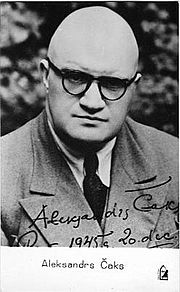Aleksandrs Čaks facts for kids
Quick facts for kids
Aleksandrs Čaks
|
|
|---|---|

Aleksandrs Čaks in 1945
|
|
| Born | October 27, 1901 Rīga, Russian empire (Now Latvia) |
| Died | February 8, 1950 (aged 48) Rīga, Latvian SSR (Now Latvia) |
| Occupation | Poet, writer |
| Nationality | Latvian |
Aleksandrs Čaks (born Aleksandrs Čadarainis; October 27, 1901 – February 8, 1950) was a famous Latvian poet and writer. He was special because his poems were all about city life, especially his beloved city of Riga. Before him, most Latvian writers wrote about the countryside. Čaks brought the busy streets and people of the city into his stories and poems.
Contents
About Aleksandrs Čaks
Early Life and Education
Aleksandrs Čaks was born in Riga, which is now the capital of Latvia. His father was a tailor. Čaks loved Riga and often wrote about its everyday life in his poems.
In 1911, he started studying at Alexanders Gymnasium in Riga. When World War I began, his school moved first to Estonia and then to Russia. He got a good education there and enjoyed reading books by famous thinkers like Immanuel Kant and Friedrich Nietzsche.
University and Early Career
In 1918, Čaks began studying medicine at Moscow State University in Russia. He was very active in student cultural life. He often joined discussions with other young writers and poets.
In 1920, Čaks joined the Soviet Red Army. He worked in a military hospital, helping to organize cultural and political events for the soldiers.
Return to Latvia and Writing
Čaks returned to Latvia in 1922. He tried to continue his medicine studies at the University of Latvia in Riga. However, he soon realized he was more interested in writing and left his studies.
In 1925, Čaks became a certified teacher. He worked at a primary school in Drabeši as a teacher and administrator. But in 1927, he decided to focus completely on his writing.
Literary Work and Challenges
In 1928, Čaks started a magazine called Jauno Lira for young Latvian writers. He also wrote for a left-leaning magazine called Trauksme. From 1930 to 1934, he was a secretary for the Latvian writer and journalist trade union. He also helped edit another magazine, Domas.
Things changed in 1934 after a political event led by Kārlis Ulmanis. Many trade unions and magazines were closed. Čaks then worked as a clerk at the Riga city savings bank until 1939. He also gave lectures about literature at a private school.
He helped publish a book of memories from Latvian soldiers called Latviešu strēlnieki. These stories inspired him to write a collection of long poems called Mūžības Skartie. He won an award for this book in 1939. From 1939 to 1940, he worked for a large Latvian magazine called Atpūta.
Later Life and Legacy
When the Soviet occupation of Latvia in 1940 happened, some of Čaks's poems were criticized. Even so, he joined the writers' union in 1941. During the Occupation of Latvia by Nazi Germany, he was not allowed to publish his works. He lived a quiet life during this time. In 1943, he wrote a play.
After the Soviet re-occupation of Latvia in 1944, Čaks started working for a big Soviet newspaper called Cīņa. He led the cultural section. However, in 1946, he faced more criticism for his writing and was fired from the newspaper in 1947. He then worked at the Institute of Language and Literature.
The criticism continued. In 1949, Čaks was accused of not following the ideas of Marxism and writing "politically incorrect" works. These accusations made him very ill. He died of heart disease on February 8, 1950.
Today, one of the main streets in Riga is named after Aleksandrs Čaks. There is also a museum dedicated to him on that street and a statue in a nearby park.
Čaks's Works
Čaks published his first book of poems, Seši, in 1928. This book was all about Riga and its busy city life. He showed his deep love for Riga in his works, like in a poem titled "Heart on the pavement."
But Riga wasn't the only thing he wrote about. Čaks also wrote romantic poems and works about the brave Latvian riflemen. He wrote some short stories too, but his poems are much more famous.
See also
 In Spanish: Aleksandrs Čaks para niños
In Spanish: Aleksandrs Čaks para niños
- Drabeši Manor
- Inara Cedrins, "Between Two Rains." Selected poems translated into English, e-book, 2013. ISBN B00C10SNZG. https://www.amazon.com/Between-Two-Rains-Aleksandrs-Caks-ebook/dp/B00C10SNZG

